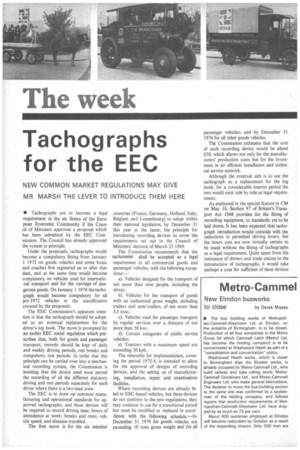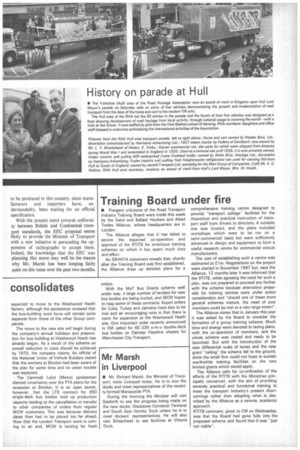Tachographs for the EEC
Page 14

Page 15

If you've noticed an error in this article please click here to report it so we can fix it.
NEW COMMON MARKET REGULATIONS MAY GIVE MR MARSH THE LEVER TO INTRODUCE THEM HERE
• Tachographs are to become a legal requirement in the six States of the European Economic Community if the Council of Ministers approves a proposal which has been submitted by the EEC Com mission. The Council has already approved the system in principle.
Under the proposals, tachographs would become a compulsory fitting from January 1 1972 on goods vehicles and some buses and coaches first registered on or after that date, and at the same time would become compulsory on vehicles used for international transport and for the carriage of dangerous goods. On January 1 1974 the tachograph would become compulsory for all pre-1972 vehicles in the classification covered by the proposals.
The EEC Commission's apparent intention is that the tachograph should be adopted as an eventual replacement for the driver's log book. The move is prompted by an earlier EEC social regulation which prescribes that, both for goods and passenger transport, records should be kept of daily and weekly driving periods, rest breaks and compulsory rest periods. In order that this principle can be carried over into a mechanical recording system, the Commission is insisting that the device used must permit the recording of all the different statutory driving and rest periods separately for each driver where there is a two-man crew.
The EEC is to draw up common manufacturing and operational standards for approved tachographs, and these devices will be required to record driving time; hours of attendance at work; breaks and rests; vehicle speed; and distance travelled.
The first move is for the six member countries (France, Germany, Holland, Italy, Belgium and Luxembourg) to adopt within their national legislation, by December 31 this year at the latest, the principle for introducing recording devices to cover the requirements set out in the Council of Ministers' decision of March 25 1969.
The Commission recommends that the tachometer shall be accepted as a legal requirement in all commercial goods and passenger vehicles, with the following exceptions : a). Vehicles designed for the transport of not more than nine people, including the driver; h). Vehicles for the transport of goods with an authorized gross weight, including trailers and semi-trailers, of not more than 3.5 tons; c). Vehicles used for passenger transport by regular services over a distance of not more than 50 km; d). Certain categories of public service vehicles; e). Tractors with a maximum speed not exceeding 30 kph.
The timetable for implementation, covering the period 1972-4, is intended to allow for the approval of designs of recording devices, and the setting up of manufacturing, installation, repair and examination facilities.
Where recording devices are already fitted to EEC-based vehicles, but these devices do not conform to the new regulations, they may continue in use for a transitional period but must he modified or replaced in accordance with the following schedule:—by December 31 1974 for goods vehicles not exceeding 10 tons gross weight and for all passenger vehicles; and by December 31 1976 for all other goods vehicles.
The Commission estimates that the cost of each recording device would be about £58, which allows not only for the manufacturers' production costs but for the investment in an efficient installation and technical service network.
Although the eventual aim is to use the tachograph as a replacement for the log book, for a considerable interim period the two would exist side by side as legal requirements.
As explained in the special feature in CM on May 16, Section 97 of Britain's Transport Act 1968 provides for the fitting of recording equipment, to standards yet to be laid down. It has been expected that tachograph introduction would coincide with the reductions in permitted driving hours, but the hours cuts are now virtually certain to be made without the fitting of tachographs as a legal requirement. Quite apart from the resistance of drivers and trade unions to the introduction of tachographs, it would take perhaps a year for sufficient of these devices
to be produced in this country, since manufacturers and importers have, understandably, been waiting for an official specification.
With the present trend towards uniformity between British and Continental transport standards, the EEC proposal seems likely to provide the Minister of Transport with a new initiative in persuading the opponents of tachographs to accept them. Indeed, the knowledge that the EEC was planning this move may well be the reason why Mr. Marsh has been keeping fairly quiet on this issue over the past two months.












































































































